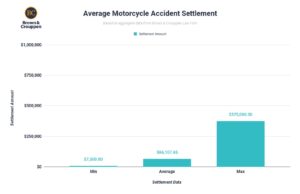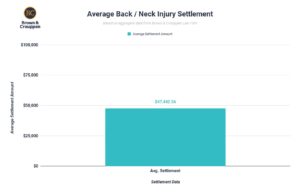
Use our guide to understand key legal considerations and what to do after a motorcycle accident.
Step 1: Ensure Safety
After a collision, if you’re able, move yourself and your motorcycle off the road to avoid further danger and prevent additional accidents. As with any accident, gathering evidence from the scene is essential to support any future legal claims. This can include taking photographs of the collision site and any damage to your motorcycle. These details will help attorneys and insurance companies better understand the circumstances of the accident.
Be sure someone contacts 911 so that police can file a report and EMS can assess any injuries. Getting officers and EMS to the scene of the collision is important for any possible legal claims, no matter how severe the accident was. If the police do not come to the scene, make sure to go to a police station and make a report of the accident as soon as possible.
Don’t sign anything or maybe any statements to public sources. It’s vital to keep contact with the other parties minimal and only give statements to police officers and EMS.

Step 2: Check for Injuries
The most important thing to do is seek medical attention immediately. Adrenaline is often heightened following an accident, masking injuries that could cause issues later. It is crucial to visit an urgent care, emergency room, or primary care physician as soon as possible to get checked out.
Motorcycle accidents are susceptible to a range of injuries, including road rash, broken bones, and head injuries that may require medical intervention. It’s essential to receive a thorough examination, as some injuries, such as concussions or internal injuries, may not present symptoms right away. Documenting any medical treatments or expenses related to the accident is also important for your records and potential claims.
If possible, you should obtain copies of all medical bills, receipts, and records of treatments, as these will be critical in establishing the extent of your injuries and the associated costs. Additionally, following your healthcare provider’s recommendations for follow-up appointments, rehabilitation, or physical therapy can aid your recovery and demonstrate the seriousness of your injuries should you pursue legal action. Having proper documentation of your injuries and treatment can all help support any potential claim. More importantly, your health and well-being should always be the top priority after an accident.
Step 3: Exchange Contact Info
While keeping contact with the other driver(s) brief is essential, collect essential information such as their name, contact details, driver’s license, and insurance information. Also, take photos of their vehicle, including the make and model. Avoid apologizing or making statements that could be interpreted as admitting fault, even if you’re trying to be polite. Remain calm and composed during the exchange, as anything you say could be used against you later.
For more information, see liability and fault in motorcycle accidents.
Step 4: Gather All Important Documents
The police report is the most important document that any legal and insurance matter will require. Once the officer has thoroughly documented the scene and filed a report, request a copy of the document, as it will be used by insurance companies and in court proceedings. This will usually contain statements of all parties, the officer’s observation, and insurance information if you could not obtain that at the time of the accident.
In addition to the police report, it’s important to document all of your recollections of the events. This can include personal feelings, weather conditions, and road and traffic conditions.
Step 5: Contact Your Insurance Company
After ensuring your health and safety, the next important step is to notify your insurance company about the accident. Contact them as soon as possible to report the incident, providing all necessary details to initiate the claims process. Be prepared to share the police report, any photos or videos from the scene, and the contact information and insurance details of the other party involved.
Step 6: Contact an Attorney
Legal claims after a motorcycle accident can be complex when injuries are involved. It is important to consult with a personal injury attorney who can help protect your rights and ensure you receive fair compensation for your injuries. Each state has a specific time limit on filing a lawsuit, known as the statute of limitation. For Illinois, the statute of limitations is 2 years; for Missouri, the statute of limitations is 5 years; and 2 years for the state of Kansas. While it’s important to know the deadlines, it’s important to consult an attorney as soon as possible to be able to receive a proper evaluation of your case and potential steps to further a claim.
The average motorcycle accident lawsuit is worth nearly $70,000. However, it’s important to understand that there are many variables that can affect settlement value, and settlement amounts may be higher or lower based on many factors.
How an Attorney Can Help with a Motorcycle Accident
Hiring an experienced motorcycle accident attorney can significantly impact the outcome of your case, helping you secure the compensation you deserve.
- Legal Expertise: Attorneys specializing in motorcycle accidents understand the laws and regulations related to these cases, helping navigate complex legal issues.
- Case Evaluation: They can assess the details of your accident, including liability, damages, and potential compensation, providing you with a clearer understanding of your case’s value.
- Evidence Collection: Attorneys gather crucial evidence, such as police reports, witness statements, and medical records, to support your claim.
- Negotiation with Insurance Companies: They handle all communications with insurance companies, advocating for a fair settlement on your behalf and protecting you from lowball offers.
- Litigation: If a fair settlement cannot be reached, an attorney can represent you in court, presenting your case effectively to seek maximum compensation.
- Guidance on Medical Care: They can advise on the necessary medical treatment and documentation to strengthen your case and ensure you prioritize your recovery.
- Understanding Statutes of Limitations: An attorney is familiar with the time limits for filing claims, ensuring you meet all deadlines to preserve your right to compensation.
- Peace of Mind: Having legal representation allows you to focus on your recovery while your attorney manages the legal complexities of your case.
Get Help from A Motorcycle Accident Attorney at Brown & Crouppen
If you or a loved one has suffered injuries due to a motorcycle incident, you might be entitled to compensation. Our legal team is here to help you learn more about your legal options and evaluate the strength of your motorcycle accident claim. We care about our community and have dedicated our practice to helping injury victims recover justice, accountability, and compensation.
Get started by calling us at (800) 536-4357 or by requesting a free case evaluation online. Our St. Louis and Kansas City motorcycle accident attorneys have helped clients recover millions in settlements and verdicts. And remember, there are no upfront costs or legal fees – we only get paid if you win.









